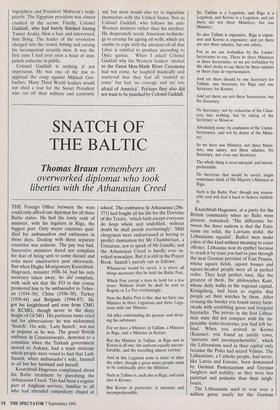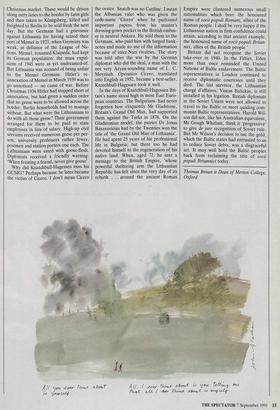SNATCH OF THE BALTIC
Thomas Braun remembers an
overworked diplomat who took liberties with the Athanasian Creed
THE Foreign Office between the wars could only afford one diplomat for all three Baltic states. He had the lowly rank of minister, with his legation in Riga, the biggest port. Only major countries qual- ified for ambassadors and embassies in those days. Dealing with three separate countries was arduous. The pay was bad. Successive ministers dared not complain for fear of being sent to some distant and even more unattractive post afterwards. But when Hughe Montgomery Knatchbull- Hugessen, minister 1930-34, had his only secretary taken away, he did complain, with such wit that the FO in due course promoted him to be ambassador to Teher- an (1934-36), China (1936-38), Turkey (1939-44) and Belgium (1944-47). He got his knighthood and rose from CMG to KCMG, though never to the dizzy height of GCMG. His patrician name cried out for abbreviation: he was nicknamed 'Snatch'. His wife, 'Lady Snatch', was not as popular as he was. The grand British embassy in Constantinople, demoted to a consulate when the Turkish government moved to Ankara, had a main staircase which people were vexed to find that Lady Snatch, when ambassador's wife, banned to all but her husband and herself.
Knatchbull-Hugessen complained about his Baltic treatment by parodying the Athanasian Creed. This had been a regular part of Anglican services, familiar to all who had attended compulsory chapel at school. The combative St Athanasius (296- 373) had fought all his life for the Doctrine of the Trinity, 'which faith except everyone do keep whole and undefiled, without doubt he shall perish everlastingly'. Mild clergymen were embarrassed at having to predict damnation for Mr Chamberlain, a Unitarian, not to speak of Mr Gandhi; and the Athanasian Creed is hardly ever in- voked nowadays. But it is still in the Prayer Book. Snatch's parody ran as follows: Whosoever would be saved, it is above all things necessary that he hold the Baltic Post, Which Post except a man do hold for a few years: Without doubt he shall be sent to Bogota or La Paz everlastingly.
Now the Baltic Post is this: that we have one Minister in three Legations and three Lega- tions with one Minister.
All alike confounding his person: and divid- ing his substance.
For we have a Minister in Tallinn, a Minister in Riga, and a Minister in Kovno;
But the Minister in Tallinn, in Riga and in Kovno is all one: the uniform equally uncom- fortable, and the travelling almost eternal;
And in this Legation none is afore or after the other; though a great many people seem to be continually after the Minister.
Such as Tallinn is, such also is Riga; and such also is Kovno;
But Kovno in particular: is uncreate and incomprehensible.
So, Tallinn is a Legation, and Riga is a Legation, and Kovno is a Legation; and yet there are not three Ministers, but one Minister; So also Tallinn is expensive, Riga is expen- sive and Kovno is expensive; and yet there are not three salaries, but one salary, For as we are forbidden by the Under- Secretaries to say, There be three Ministers or three Secretaries: so we are forbidden by the chief clerks to say there be three salaries or three frais de representation.
And yet there should be one Secretary for Tallinn: one Secretary for Riga and one Secretary for Kovno; And yet there are not three Secretaries: but No Secretary.
No Secretary: not by reduction of the Chan- cery into nothing, but by taking of the Secretary to Moscow.
Absolutely none: by confusion of the Under- Secretaries, and not by desire of the Minis- ter.
So we have one Minister, not three Minis- ters; one salary, not three salaries; No Secretary, not even one Secretary.
The whole thing is most unequal: and incom- prehensible.
He therefore that would be saved: might sometimes think of His Majesty's Minister at Riga.
Such is the Baltic Post: though any reason- able soul will find it hard to believe faithful- ly.
Knatchbull-Hugessen, at a party for the British community when no Balts were present, remarked, 'The difference be- tween the three nations is that the Esto- nians are solid, the Latvians stolid, the Lithuanians squalid'. Balliol men make jokes of this kind without meaning to cause offence. Lithuania won its epithet because to reach it by train you had to pass through the neat German province of East Prussia, whose square fields, square houses and square-headed people were all in perfect order. They kept perfect time, like the greatest of them, the philosopher Kant, whose daily walks in the regional capital, K6nigsberg, had been so regular that people set their watches by them. After crossing the border you found messy farm- steads with scrabbling geese and irregular haystacks. The privies in the first Lithua- nian state did not compare with the im- peccable teuto-lavatories you had left be- hind. When you arrived in Kovno (Kaunas), you found an untidy town, `uncreate and incomprehensible', which the Lithuanians used as their capital only because the Poles had seized Vilnius. The Lithuanians, a Catholic people, had never, like Latvia and Estonia, been dominated by German Protestantism and German burghers and nobility; so they were less punctual and pedantic than their neigh- bours.
The Lithuanians used to rear over a million geese yearly for the German Christmas market. These would be driven along rutty lanes to the border by farm girls and then taken to Konigsberg, killed and freighted to Berlin to be sold fresh the next day. But the Germans had a grievance against Lithuania for having seized their port of Memel in 1923, when Germany was weak, in defiance of the League of Na- tions. Memel, renamed Klaipeda, had kept its German population: the mass expul- sions of 1945 were as yet undreamed-of. But Lithuania was accused of being unfair to the Memel Germans. Hitler's re- annexation of Memel in March 1939 was to go unnoticed — no cause of war. Before Christmas 1936 Hitler had stopped short of annexation, but had given a sudden order that no geese were to be allowed across the border. Berlin households had to manage without. But what were the Lithuanians to do with all those geese? Their government arranged for them to be paid to state employees in lieu of salary. High-up civil servants received numerous geese per per- son; university professors rather fewer; postmen and station porters one each. The Lithuanians were sated with goose-flesh. Diplomats received a friendly warning: 'When feasting a friend, never give goose'. Why did Knatchbull-Hugessen miss his GCMG? Perhaps because he later became the victim of Cicero. I don't mean Cicero the orator. Snatch was no Catiline. I mean the Albanian valet who was given the code-name 'Cicero' when he purloined important papers from his master's dressing-gown pocket in the British embas- sy in neutral Ankara. He sold them to the Germans, who paid him with forged bank- notes and made no use of the information because of inter-Nazi rivalries. The story was told after the war by the German diplomat who did the deal, a man with the not very Aryan-sounding name of L. C. Moyzisch. Operation Cicero, translated into English in 1952, became a best-seller. Knatchbull-Hugessen took it well.
In the days of Knatchbull-Hugessen Bri- tain's name stood high in most East Euro- pean countries. The Bulgarians had never forgotten how eloquently Mr Gladstone, Britain's Grand Old Man, had supported them against the Turks in 1876. On the Gladstonian model, the patriot Dr Jonas Basanavicius had by the Twenties won the title of 'the Grand Old Man of Lithuania'. He had spent 25 years of his professional life in Bulgaria; but there too he had devoted himself to the regeneration of his native land. When, aged 72, he sent a message to the British Empire, 'whose powerful sheltering arm the Lithuanian Republic has felt since the very day of its rebirth . . . around the ancient Roman Empire were clustered numerous small nationalities which bore the honoured name of socii populi Romani, allies of the Roman people. I shall be very happy if the Lithuanian nation in firm confidence could attain, according to that ancient example, the honoured name of socii populi Britan- nici, allies of the British people.'
Britain did not recognise the Soviet take-over in 1940. In the Fifties, Eden more than once reminded the United Nations of Baltic enslavement. The Baltic representatives in London continued to receive diplomatic courtesies until they died. The last survivor, the Lithuanian chargé d'affaires, Vincas Balickas, is still installed in his legation. British diplomats in the Soviet Union were not allowed to travel to the Baltic or meet quisling com- munist Baltic representatives. Harold Wil- son did not, like his Australian equivalent, Mr Gough Whitlam, think it 'progressive' to give de jure recognition of Soviet rule. But Mr Wilson's decision to use the gold, which the Baltic states had entrusted to us to reduce Soviet debts, was a disgraceful act. It may well hold the Baltic peoples back from reclaiming the title of socii populi Britannici today. '
Thomas Braun is Dean of Merton College, Oxford



















































 Previous page
Previous page